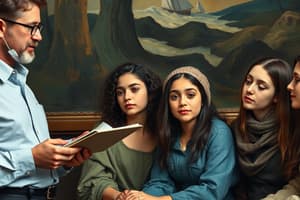Podcast
Questions and Answers
What is the goal of incorporating popular music into school music programs?
What is the goal of incorporating popular music into school music programs?
- To replace classical, folk, and jazz traditions
- To appeal to young people's musical tastes
- To create a more diverse curriculum (correct)
- To challenge students' musical abilities
What is the purpose of juxtapositional pedagogy in music education?
What is the purpose of juxtapositional pedagogy in music education?
- To teach only classical music
- To contrast musical learning experiences (correct)
- To focus on a single musical genre
- To prepare students for informal learning
What is the benefit of including popular music in music teacher education programs?
What is the benefit of including popular music in music teacher education programs?
- To replace traditional classroom protocols
- To teach novice educators how to read notation
- To help faculty discover aspects of their student teachers' personalities (correct)
- To provide additional support for beginning teachers
What is the importance of culturally responsive teaching in music education?
What is the importance of culturally responsive teaching in music education?
What is the aim of the course 'Learning Approaches in Music Education' at UCLA?
What is the aim of the course 'Learning Approaches in Music Education' at UCLA?
What is the benefit of using popular music pedagogy in music teacher education programs?
What is the benefit of using popular music pedagogy in music teacher education programs?
What is the benefit of using the juxtapositional approach in music teacher education programs?
What is the benefit of using the juxtapositional approach in music teacher education programs?
Why is it important for future music educators to develop the skills required to manage student behavior in conventional classrooms?
Why is it important for future music educators to develop the skills required to manage student behavior in conventional classrooms?
What is the focus of Popular Music Pedagogies: A Practical Guide for Music Teachers?
What is the focus of Popular Music Pedagogies: A Practical Guide for Music Teachers?
Who is the ideal audience for this textbook?
Who is the ideal audience for this textbook?
What resources are available on the website for Popular Music Pedagogies: A Practical Guide for Music Teachers?
What resources are available on the website for Popular Music Pedagogies: A Practical Guide for Music Teachers?
Flashcards are hidden until you start studying
Study Notes
Teaching Popular Music in Schools: Challenges and Opportunities
-
Music teacher education programs face challenges in preparing new teachers for diverse music teaching careers.
-
Prospective teachers must acquire excellent musicianship skills, become polished performers, and demonstrate creative abilities through composition and improvisation.
-
The need for including popular music instruction in school music programs has been a topic of significant discussion and research over the past several decades.
-
Young people are drawn to the enormous varieties of popular music genres that have a broad audience and are instantly available through digital media downloads.
-
The curricular offerings in school music education programs tend towards classical, folk, and jazz traditions that are not as appealing to young people as the popular forms of music they listen to daily.
-
Incorporating popular music into the school curriculum might lead to culturally responsive music pedagogies.
-
Informal music learning practices include starting with music that learners know and like, copying recordings of real music by ear, learning alone and in groups with peers without adult guidance or supervision, learning that is not progressive from simple to complex but instead holistic, idiosyncratic, and haphazard, and integrating listening, performing, improvising, and composing throughout the learning process.
-
Students in music classes should not just aim to learn about music but, more importantly, learn to become better musicians and develop their lifelong interest in music.
-
Culturally responsive teaching attempts to provide all children with equitable learning experiences and suggests that teachers must learn to recognize, honor and incorporate the personal abilities of students into their instructional strategies.
-
Music education programs must prepare future teachers to employ the principles of culturally responsive pedagogy in order to be effective when working in increasingly diverse schools.
-
Teaching popular music can contribute to culturally responsive pedagogical practices in music.
-
The music education program at UCLA has redesigned its curriculum to address the demographic changes seen in schools as well as the evolving musical interests of modern K–12 students, incorporating popular music through the use of juxtapositional pedagogy.Juxtapositional Pedagogy in Music Education: Integrating Popular and Classical Music
-
Juxtapositional pedagogy places contrasting pairs of musical learning experiences together in a single instructional setting to examine musical thinking and learning from multiple perspectives.
-
This approach prepares future music educators to teach traditional offerings of large ensembles and general music while also preparing them to teach popular and multicultural music education.
-
Popular music pedagogy is infused into all music education method courses, allowing diverse musical styles to be studied from a variety of perspectives and cultures.
-
The approach nurtures flexibility and adaptability in future teachers, enabling them to function in diverse school settings and understand that teaching in a musical or cultural tradition other than their own is possible.
-
The course "Learning Approaches in Music Education" establishes the foundations for achieving the program's instructional goals and includes aural learning on both clarinet and guitar, developing students' confidence in nontraditional learning processes.
-
The course's final assignment requires students to form small ensembles, select a popular cover song, and perform it for the class without using notation, nurturing their creative teaching skills.
-
The UCLA music education program provides future music educators with the skills needed to teach beginning violin and popular guitar instruction in two elementary schools.
-
Novice teachers received additional support through a sequential guitar instructional guide that provided curricular structure while allowing informal pedagogy of learning by ear instead of reading notation.
-
Student teachers found commonality between teaching popular and classical music and drew connections between the two styles.
-
Beginning teachers will require more in-depth preparation to effectively teach popular music in schools and need to question their understanding of what music teaching and learning are.
-
Classical and popular music are different musical experiences requiring musicianship of a different nature.
-
Music education programs can benefit from mutually valuable interactions between popular and classical music learning experiences.The Role of Popular Music in Music Teacher Education
-
Adding formalized procedures is essential for beginning teachers in classrooms with large numbers of students, even when teaching popular music.
-
Novice educators need to learn how to balance popular methodologies and traditional classroom protocols in popular music teaching.
-
Reflections on the role of popular music in music teacher education are essential for preparing future music educators to teach in twenty-first-century schools.
-
The juxtapositional approach used at UCLA pairs formal with informal learning, notation-based instruction with aural music learning, and classical traditions with popular genres.
-
Both music teacher educators and future music teachers tend to have backgrounds based on classical rather than popular music practices.
-
Future educators need to develop the skills required to manage student behavior in conventional classrooms, where informal- and constructivist-based instructional practices cannot be employed.
-
Novices will need to be flexible as they adapt popular music pedagogies for use in schools.
-
Children are often very accepting of different musics and different approaches to instruction, and traditional and popular music become increasingly engaging to students when presented in contrast with one another.
-
Popular music can be used in the teacher preparation process to help faculty discover aspects of their student teachers’ personalities that might be suppressed.
-
Creating cover songs with peers of their choosing offers a nonthreatening way for music education majors to explore and discover aspects of their own personalities that they might not be aware of.
-
When asked to create a music video during a music technology class, students will often surprise us and reveal aspects of their personalities that are anything but the reserved presences they portray when trying to teach as music directors from the podium.
-
When thoughtfully paired, both classical and popular music offer music teacher educators ways to understand the novice teachers who are studying to enter the profession and provide future music educators with ways to adapt to changing curricular needs in schools and motivate their own students.
Studying That Suits You
Use AI to generate personalized quizzes and flashcards to suit your learning preferences.




